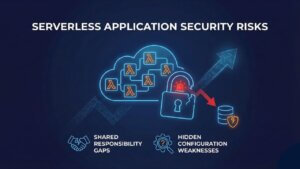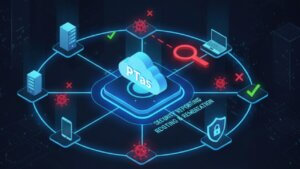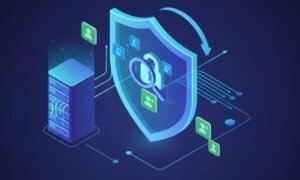Fortinet, a globally trusted provider of cybersecurity infrastructure, recently issued an update confirming that a serious security vulnerability, CVE-2023-42788, affects not only FortiManager and FortiAnalyzer, but also their cloud-based counterpart, FortiAnalyzer-Cloud. This vulnerability, categorized as an OS command injection issue (CWE-78), presents a real risk of unauthorized code execution even by low-privileged local attackers.
We look at an overview of the vulnerability, its implications, and detailed steps for mitigation.
-Book Your FREE Cyber Security Consultation Today!
What is CVE-2023-42788
CVE-2023-42788 stems from an improper neutralization of special elements in OS commands within Fortinet’s command-line interface (CLI). Attackers with local access and minimal privileges can craft malicious inputs to exploit this flaw, effectively injecting and executing unauthorized commands.
Discovered by Loïc Restoux of Orange Innovation and reported through Orange CERT-CC, this vulnerability underscores persistent risks in CLI handling, especially given its connection to a previously identified issue, CVE-2021-26104, which had an incomplete patch.
Impacted Fortinet Products
FortiManager
FortiAnalyzer
FortiAnalyzer-Cloud
These tools are widely used in enterprise environments for centralized management, analytics, and network monitoring, making any compromise particularly severe.
Security Implications
The severity of CVE-2023-42788 lies in the following risks:
Privilege escalation from low-privileged user accounts
Remote code execution via internal compromise
Persistence installation and network pivoting
Disruption of centralized security analytics
In environments where Fortinet devices serve as the backbone for managing security events, any breach could render the entire setup blind to malicious activities.
Possible Solutions
To reduce the risk posed by CVE-2023-42788, organizations are strongly advised to take the following actions:
Apply Fortinet Patches Immediately
Visit the Fortinet Product Security Incident Response Team (PSIRT) page for the latest firmware updates and apply them to all affected products.Limit Local CLI Access
Restrict CLI access to trusted administrative accounts. Remove or disable local accounts with unnecessary access, especially those with limited roles.Implement Least Privilege Principles
Enforce access controls to ensure users only have the minimum permissions necessary. Avoid giving CLI-level access unless absolutely necessary.Monitor Logs and CLI Command Usage
Regularly inspect logs for suspicious command executions. Set up alerts for unexpected or unapproved CLI usage.Isolate Critical Management Interfaces
Use VLANs, firewall rules, or VPN tunnels to isolate management tools like FortiManager and FortiAnalyzer from broader network access.Review Past Fixes and Test Thoroughly
Since this vulnerability is a continuation of a previous CVE, ensure prior patches (e.g., for CVE-2021-26104) were applied correctly and verified in testing environments.
Conclusion
CVE-2023-42788 is a stark reminder of the complexity of securing CLI interfaces and the consequences of incomplete patches. Fortinet users should act swiftly to apply the latest fixes, review access permissions, and reinforce their monitoring strategies. As always, staying proactive is key to defending against increasingly sophisticated threats.
Why Businesses Trust SecureMyOrg for Comprehensive Network Security
At SecureMyOrg, we uncover and fix all possible security vulnerabilities of mobile and web, while providing solutions to mitigate risks. We are trusted by renowned companies like Yahoo, Gojek and Rippling, and with 100% client satisfaction, you’re in safe hands!







Some of the things people reach out to us for –
- Building their cybersecurity program from scratch – setting up cloud security using cost-effective tools, SIEM for alert monitoring, building policies for the company
- Vulnerability Assessment and Penetration Testing ( VAPT ) – We have certified professionals, with certifications like OSCP, CREST – CPSA & CRT, CKA and CKS
- DevSecOps consulting
- Red Teaming activity
- Regular security audits, before product release
- Full time security engineers.

Top Cybersecurity Threats Facing Businesses In 2026
Businesses entering 2026 face a security landscape that is more complex, more interconnected, and far less forgiving than in previous years. Cybersecurity threats no longer

Top 5 Security Weaknesses Cloud-Native Apps Commonly Ignore
Cloud-native applications promise speed, flexibility, and scalability. Teams ship features faster, infrastructure adapts automatically, and operational overhead drops. Yet many organizations discover later that security

Why Weak Serverless Application Security Puts Your Business at Risk
Weak security in serverless environments often goes unnoticed until it leads to real damage. Misconfigured triggers, broad permissions, and poor visibility can expose sensitive data and disrupt business operations. Understanding where the risks appear is the first step toward building safer, more reliable serverless applications.

What Is Penetration Testing as a Service?
Penetration testing as a service (PTaaS) lets experts simulate real attacks to uncover vulnerabilities before hackers do. This guide explains the process, benefits, and costs, helping businesses strengthen defenses with predictable, ongoing security checks.

How To Inspect Encrypted Traffic Without Breaking Privacy
Network administrators face a challenge: securing systems while respecting privacy. This guide explains how to inspect encrypted traffic without breaking privacy using metadata, anomaly detection, and machine learning ensuring visibility, compliance, and trust.

How to Audit Infrastructure as Code (IaC) for Security Vulnerabilities
Discover how to audit Infrastructure as Code (IaC) for security vulnerabilities with this practical guide. Learn to scan IaC files using tools like Checkov, fix issues like exposed resources, and integrate audits into CI/CD pipelines. Protect your cloud systems from misconfigurations and ensure compliance with clear, actionable steps.

